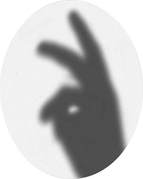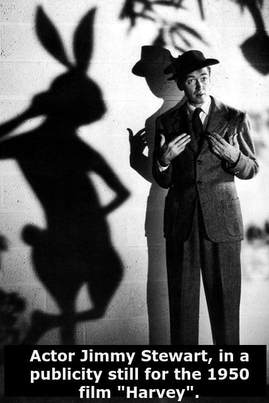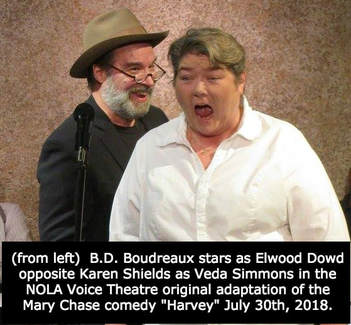|
(Note: This posting was updated on 9 July 2018) This week, our resident playwright Victor Allan Tallant shares with us his experiences adapting the classic Mary Chase comedy "Harvey" for voice theatre. Mr. Tallant was responsible for the scripts for our first Summer Series in 2017 at the late Valiant Theatre. For NVT, he created our original anthology series "Untold New Orleans", as well as original adaptations of the classic Broadway comedies "Arsenic and Old Lace," "The Man Who Came to Dinner, " and our hit production of "The Shop Around the Corner", which was invited to perform at the InFringe Festival. He is also the author of our adaptation of "It's A Wonderful Life", performed annually by the National Voice Talent Foundation.  When I was asked by NOLA Voice Theatre to do a new period-specific adaptation of Mary Chase's "Harvey," I initially thought it was a terrible idea. The title character is an invisible rabbit who only speaks to Elwood Dowd. How do you write voice theatre for a character that's unheard? As it turned out, that was the easiest problem to handle. It had been decades since I'd read "Harvey" when the project came around last September and I vaguely recalled the film starring Jimmy Stewart. On first reading of the original play, I came to several quick conclusions: It would be fairly simple to re-set the play to 1945 New Orleans, thankfully. The dialogue was dated The plot needed streamlining Characters would have to be cut to fit two and a half hours of three acts into a one-hour format.  It seemed pretty straightforward. Fortunately, I remembered the words of my college writing professor, who once told me "Walk away before you begin to work." I decided to heed her words. Partially because it was, and is good advice. But mostly because I somehow dreaded doing it. On second reading, I discovered just how well Mary Chase constructed her work. What I had taken for convolution in the plot I recognized as necessary events that illuminate the character's thoughts and feelings through seemingly random events. There isn't a joke or a gag in the show that exists simply for a laugh. Every one communicates something about the characters' personalities in the situations. The dated language is still dated, in that it demonstrates a once-common level of literacy and grammar that doesn't sit well in modern ears. I found that "modernizing" the dialogue robbed the characters of...well, character. Elwood Dowd's dialogue expresses the affable inebriate he is. His speech patterns are florid and relaxed, expressing delight with everything. His sister Veda's patterns are clipped, direct, and deeply self-indulgent: when she attempts plain speech, she sounds preposterous. Her daughter Myrtle Mae's speech is rougher, more rebellious. She always seems to be under pressure and ready to spout off. It became clear I had to preserve the original lines as often as possible. What also became clear was that cutting out characters was going to be more difficult.  Which raised the biggest problem of all. With so much of the play nearly indispensable, how was I to fit it into a single hour? The first two drafts were coming in at an hour and forty-eight minutes, and an hour and thirty-six minutes, respectively. At first, I considered cutting the entire relationship between Dr. Sanderson and Miss Kelly. But, that ended up taking away plot points, robbing Elwood of a good portion of his likability and the audience of the two young lovers. I then drafted a version in which Harvey himself narrates the story, revealing himself in the end. We abandoned that when it was realized it would ruin the character's supernatural appeal. Eventually, the first act character of Aunt Ethel had to be cut for time, the only casualty from the original. I also found a way to consolidate several of the character's lines without losing the integrity of their patterns. It was decided to craft a new ending for the show that keeps with the "only in New Orleans" theme for all the NVT adaptations. I won't spoil it for you, but suffice it to say it will leave you with a smile. And, the problem of voicing Harvey? I was reminded by the producers that one of the joys of voice theatre is "seeing via sound". It was therefore decided that Harvey's "voice" would be a custom sound effect, performed live during the show. I'm happy to have worked on this script for NOLA Voice Theatre. I have a deeper appreciation for the craft of play writing, and for Mary Chase's work. It's always a pleasure to be able to write for the talents in the company. I'm hoping next season, they might give me a crack at a lesser-known Mary Chase play, "Midgie Purvis." Victor Allan Tallant The NOLA Voice Theatre adaptation of "Harvey" performs as part of the NVT Studio Party at the new Azienda Theatre, 2000 Paris Road in Chalmette, LA. Ticket information will be coming soon.
Comments are closed.
|
What's this?Our adventures, our dreams, our problems and achievements on the road to enriching the New Orleans theatre community. Archives
May 2019
Categories |
 RSS Feed
RSS Feed